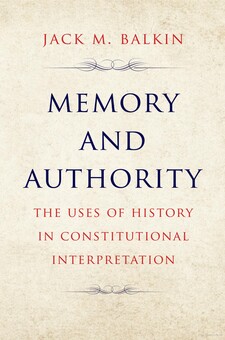Professor Balkin Awarded Book Prize by Georgetown Center for the Constitution

Professor Jack M. Balkin’s recent book on how lawyers and judges use history selectively to support their arguments has been awarded the Thomas M. Cooley Book Prize by the Georgetown Center for the Constitution.
The $50,000 award recognizes exceptional books that advance the understanding of, and commitment to, the written U.S. Constitution.

In Memory and Authority: The Uses of History in Constitutional Interpretation (Yale University Press, 2024), Balkin shows how lawyers and judges channel history through standard forms of legal argument to construct authority for their claims and undermine the authority of opposing views.
The center’s faculty director, Georgetown Law Professor Randy Barnett, called the book “a major contribution to the current debate about the proper uses of history in interpreting and applying the original meaning of our written Constitution, as well as in constitutional discourse generally.”
“Jack Balkin’s explication of what he calls ‘framework originalism’ has long defied the common misperception that originalism is just for political conservatives,” Barnett said.
Balkin, the Knight Professor of Constitutional Law and the First Amendment, will receive the prize at the Center’s annual event at the National Archives on Oct. 18. The event will also feature the 2024 Thomas M. Cooley Judicial Lecture.
“I am grateful to the Georgetown Center for the Constitution and honored to receive an award that has recognized so many distinguished books and authors,” Balkin said.
The Thomas M. Cooley Book Prize, Symposium & Judicial Lecture honors Thomas McIntyre Cooley, a longstanding chief justice of the Michigan Supreme Court, and a professor and dean at the University of Michigan Law School. Cooley authored several highly influential books, including A Treatise on the Constitutional Limitations Which Rest Upon the Legislative Power of the States of the American Union (1868).
Previous Cooley Book Prize winners include Keith E. Whittington, who will join the Yale Law School faculty this year, for Practice-Based Constitutional Law in an Era of Polarized Politics; Richard H. Fallon, Jr. ’80 for Law and Legitimacy in the Supreme Court; and Gary Lawson ’83 and Guy Seidman for A Great Power of Attorney: Understanding the Fiduciary Constitution.
Balkin is the founder and director of Yale’s Information Society Project, an interdisciplinary center that studies law and new information technologies. He also directs the Abrams Institute for Freedom of Expression, and the Knight Law and Media Program at Yale.


